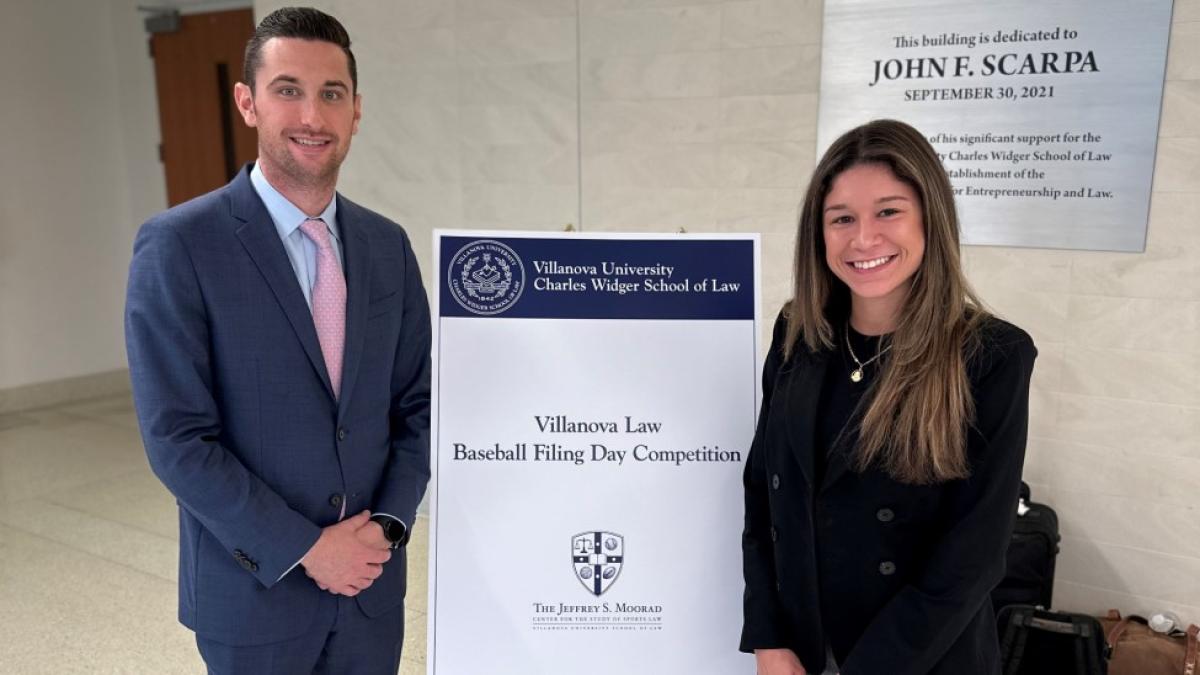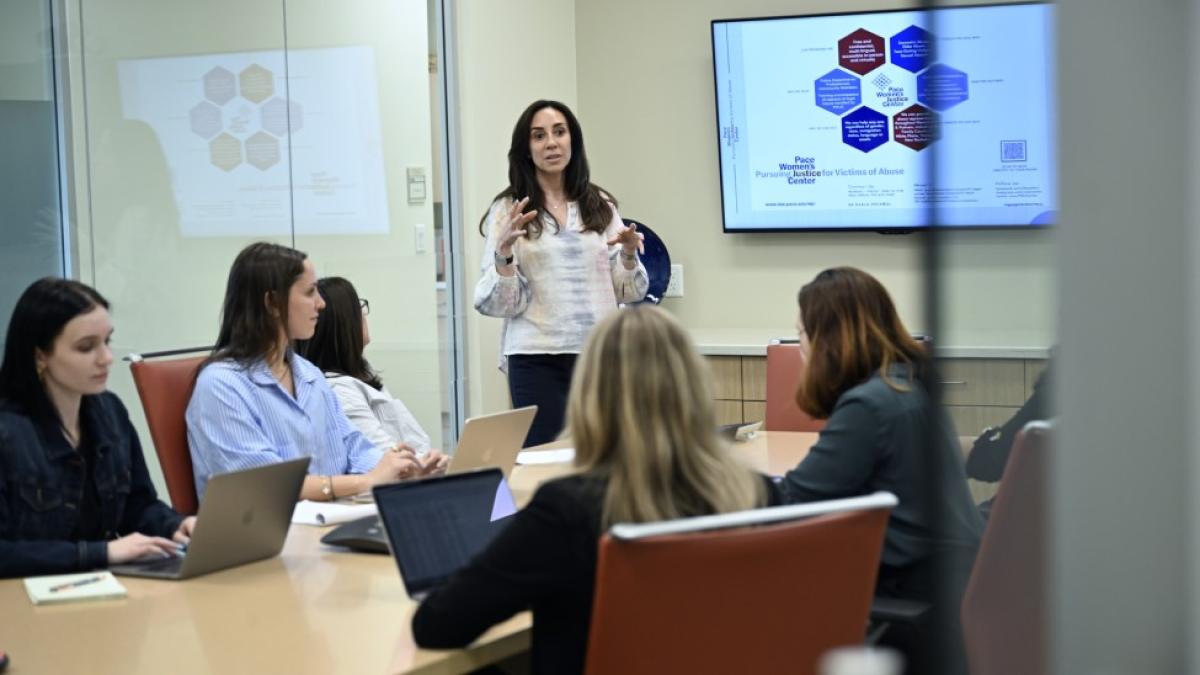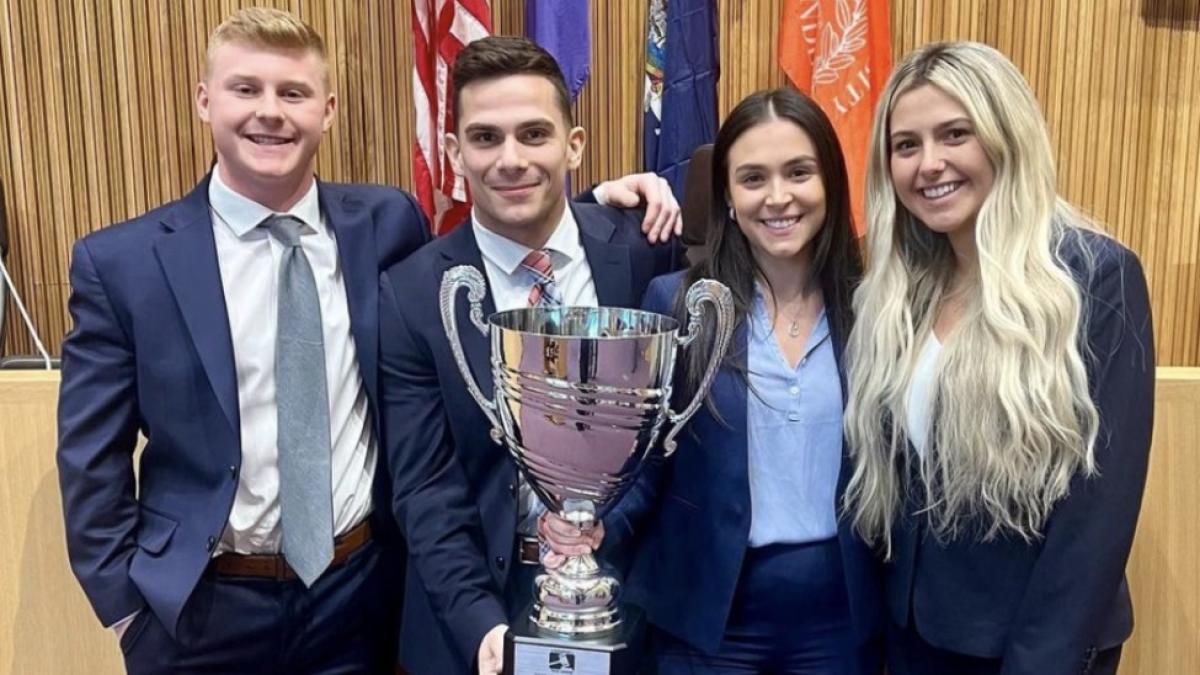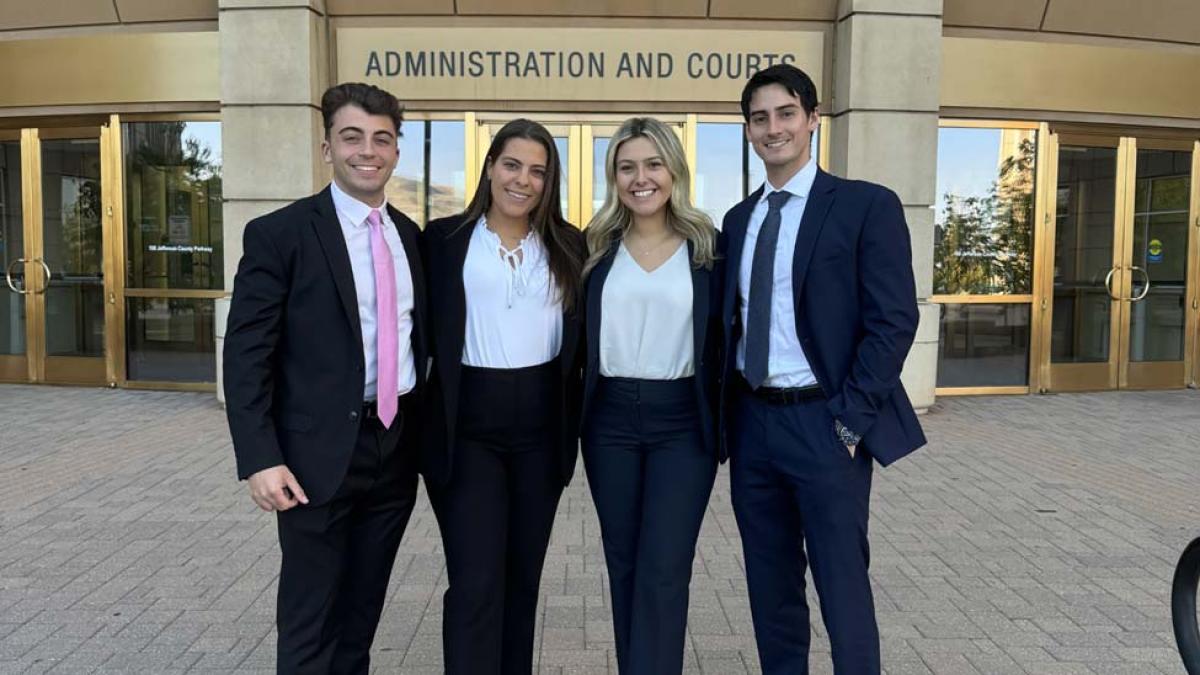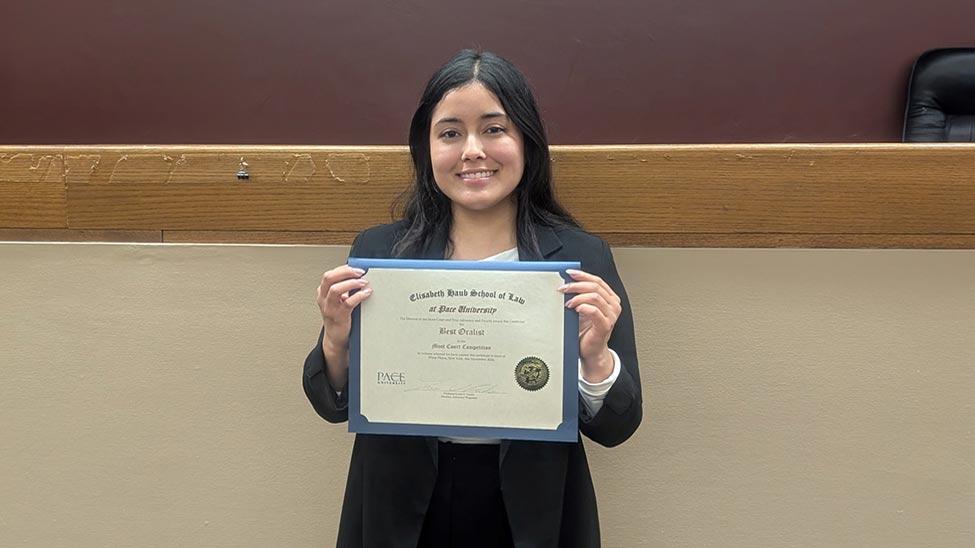
Haub Law Hosts Inaugural LLM Moot Court Competition
On Sunday November 17th, Haub Law hosted its first-ever LLM Moot Court Competition, offering LLM students from diverse backgrounds the opportunity to argue a First Amendment case in a rigorous, professional setting.
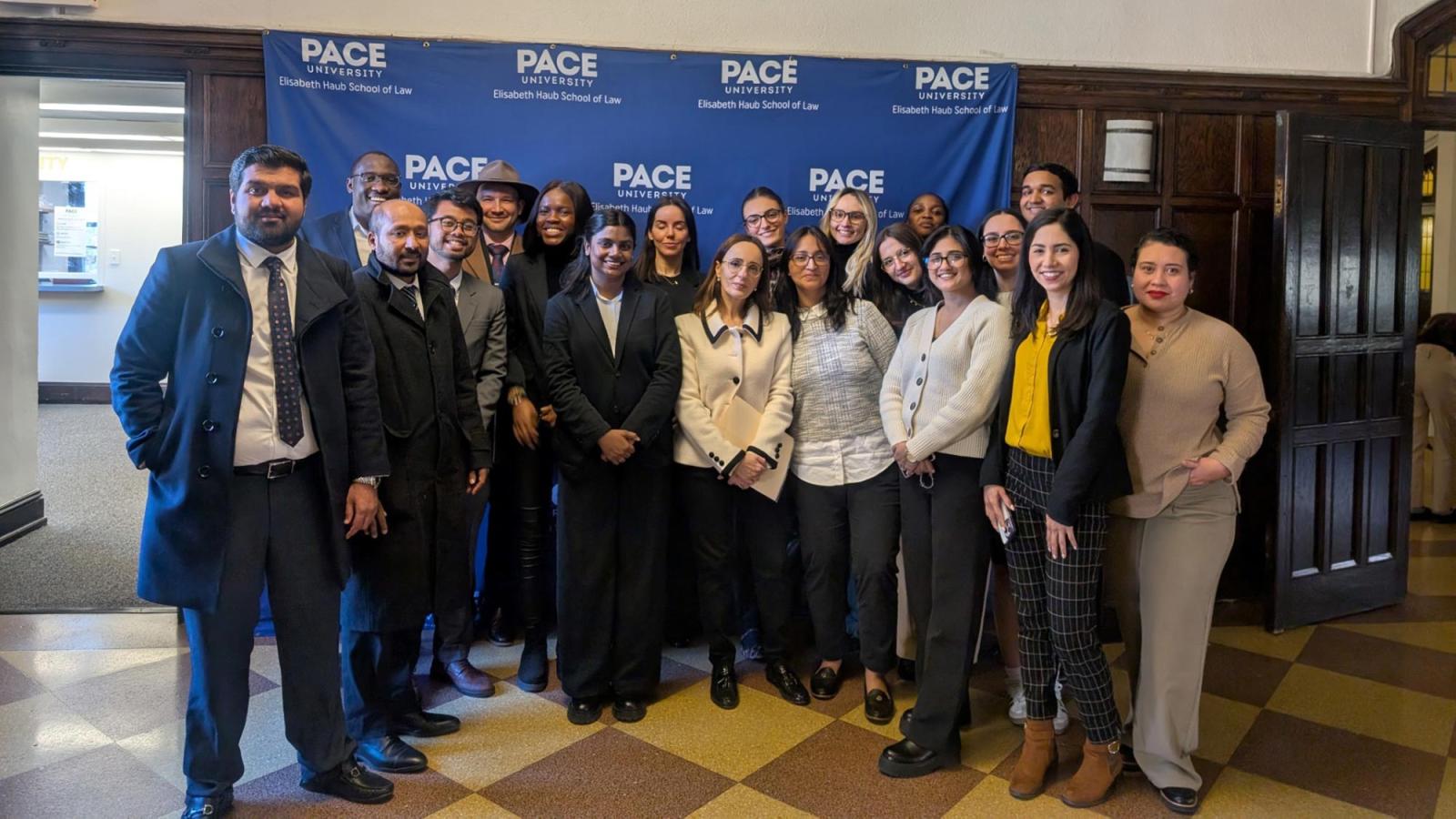
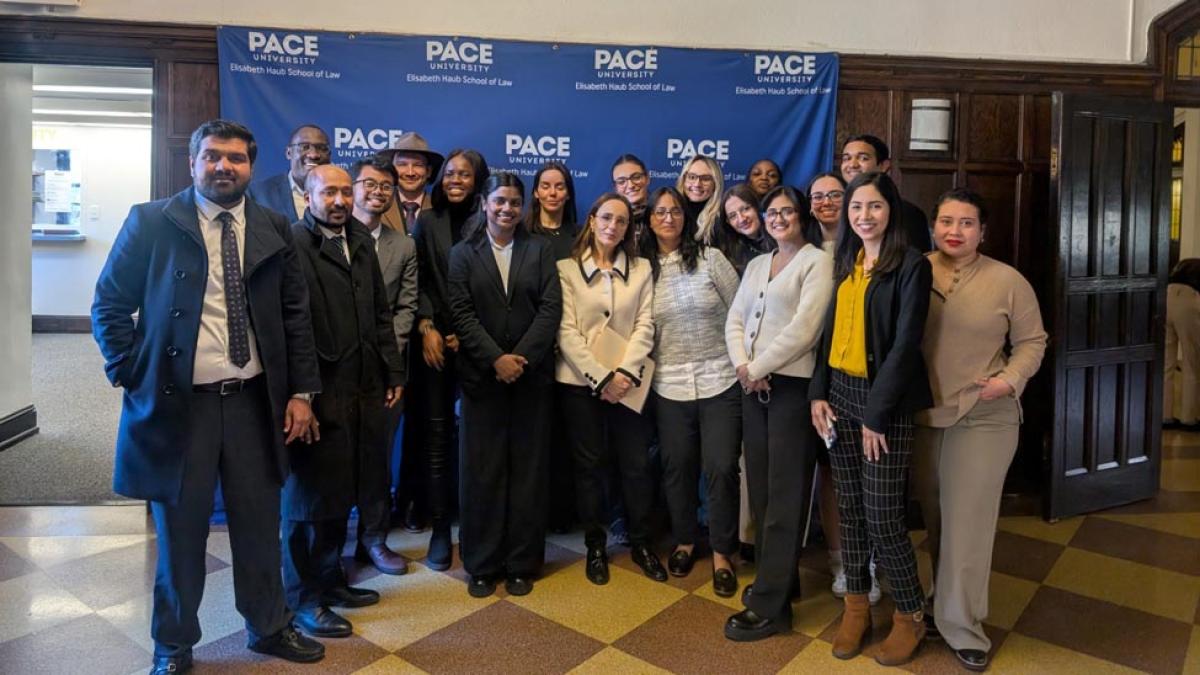

On Sunday, November 17th, Haub Law hosted its first-ever LLM Moot Court Competition, offering LLM students from diverse backgrounds the opportunity to argue a First Amendment case in a rigorous, professional setting. The competition not only showcased the advocacy skills of the LLM cohort, but also fostered connections with the broader law school community.
Four students advanced to the final rounds of the competition including Vanessa Camelo (Comparative Legal Studies), Mayara Carvallo (Comparative Legal Studies), Lola Gutierrez (Exchange Program) and Alexander Graham (Environmental Law). After a series of compelling arguments, Vanessa Camelo was named Best Oralist, demonstrating her exceptional legal reasoning and presentation skills.
“Our inaugural LLM Moot Court Competition reflects the Law School’s commitment to fostering a dynamic and inclusive academic environment while preparing students for the demands of legal practice anywhere in the world,” said Diana Ramirez, Associate Director of Graduate Programs and International Affairs. "I am incredibly proud of the performance of our students, and I look forward to seeing how this experience will enhance their legal careers."
“Our inaugural LLM Moot Court Competition reflects the Law School’s commitment to fostering a dynamic and inclusive academic environment while preparing students for the demands of legal practice anywhere in the world.”
The event, organized by Haub Law’s Advocacy Program under the guidance of Professor Louis V. Fasulo, Director of Advocacy Programs, was a milestone in providing LLM students with practical legal experiences, reflecting the Law School’s commitment to fostering a dynamic and inclusive academic environment while preparing students for the demands of legal practice anywhere in the world.
“I am thrilled about our inaugural opportunity for LLM participation in our renowned advocacy program,” added Professor Fasulo. “Our hope is to expand this exercise to include other law graduate students from local schools.”
More from Pace
Haub Law's negotiation team advanced to the semi-finals in the Villanova Baseball Filing Day Competition held November 3-4, 2023 at Villanova University Charles Widger School of Law.
PWJC’s many programs offer free legal assistance, free legal clinics open to the public, and training for professionals. It also has a robust program to recruit, train, and supervise volunteers. A dedicated team of volunteers include those who have some legal training — such as lawyers, paralegals, and law students — and those who bring other skills to Center programs, such as community members, and high school and college students.
The Elisabeth Haub School of Law at Pace University trial team won the 2024 National Trial League Competition, making them national champions! This is the first time Haub Law has won both the season and the championship title since joining the competition in 2020, marking a significant milestone for the Trial Advocacy Program.
Advocacy Education Day: Empowering Nurses to Shape Healthcare Policy
Nurses play a pivotal role in shaping the quality of care patients receive, not only through their day-to-day work, but also by influencing healthcare policies. Pace University's Advocacy Education Day is an event dedicated to empowering nurses to engage in healthcare policy and help them learn how to effectively advocate for both their patients and their profession.
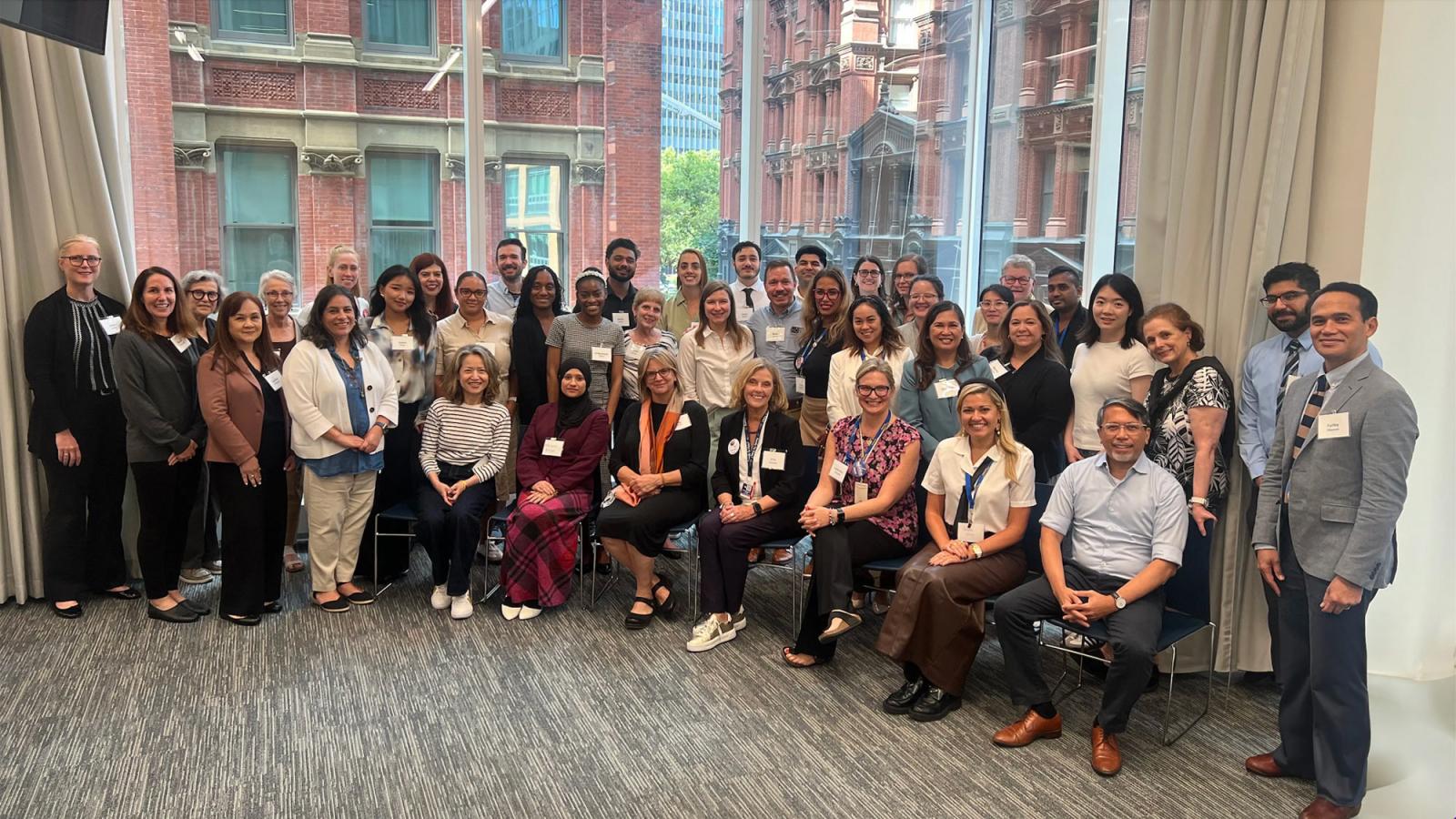
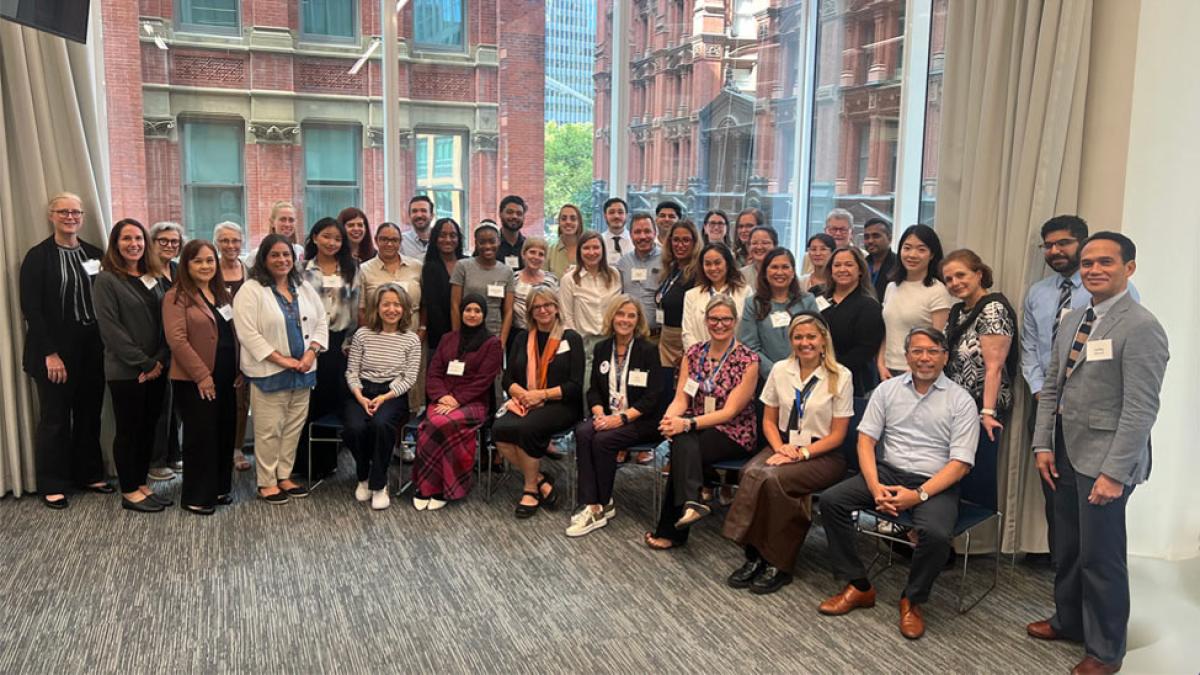
Nurses play a pivotal role in shaping the quality of care patients receive, not only through their day-to-day work, but also by influencing healthcare policies. Pace University's Advocacy Education Day is an event dedicated to empowering nurses to engage in healthcare policy and help them learn how to effectively advocate for both their patients and their profession.
This year marked the second annual Advocacy Education Day, hosted by the College of Health Professions Lienhard School of Nursing (LSN) in collaboration with NYU College of Nursing Alumni and the Mt. Sinai Center for Nursing Research and Innovation. According to Catherine Finlayson, PhD, associate professor PhD in Nursing, and chair of the Advocacy Day planning committee, this organizational partnership allowed for a broader perspective on the role of nursing advocacy. Attendees included students, nurses, educators, and healthcare leaders who joined together to discuss the importance of advocacy in shaping healthcare systems and policies.
Farley Villarente, MSN, current PhD in Nursing student at Pace University, is a repeat attendee of the event. "As nurses, we care very much about a lot of things. Advocating for our patients is one of the many roles that we highly value. Getting involved in shaping health policy is another important way we can advocate—not just for our patients, but for our profession and healthcare as a whole."
Additionally, he shared that his attendance impacted his understanding of the policy process, "Hearing from our nursing colleagues who are doing great work in advocacy has transformed the way I see my role as a nurse, and I’m sure it will do the same for you.”
It is our moral obligation as nurses to actively engage in shaping health policies. There are numerous ways to get involved, whether through membership in professional organizations like the American Nurses Association, which advocates on our behalf at the policy level, or by reaching out to our local representatives to educate them on issues that matter to nursing, our patients, and our healthcare systems.
—Farley A. Villarente, MSN
Dr. Finlayson believes that events like Advocacy Education Day are crucial in inspiring the next generation of nurses to take on advocacy roles. "It is an opportunity to learn about nursing advocacy and hear from leaders in our profession about their successful advocacy efforts. We want students and nurses to understand that there are many ways to be advocates. Lobbying is a big part of nursing advocacy, but nurses can advocate in other ways as well. After listening to these visionaries and their advocacy efforts, students will be inspired to become advocates in their own respect."
This annual event on the New York City campus is a unique opportunity for all LSN students to engage with leaders in nursing and to witness the impact that active advocacy can have. Students are able to hear firsthand from experts and experienced nurses who are already making significant strides in advocating for the nursing profession and improving patient care.
There are many ways for nurses to be advocates. After listening to these visionaries and their advocacy efforts, [students] will be inspired to become advocates in their own respect.
—Catherine Finlayson, PhD.
This year the event focused on three main areas; Nursing Advocacy 101, Nurses in Action, and Advocacy Strategy. Speakers and panels dug into topics like Nursing Impact on AI Policy and Effective change within Institutions with the former New York State Department of Health Commissioner. The day was wrapped up with a legislator reception and lunch, where elected officials, including 19th District New York State Senator Roxanne Persaud, shared their final remarks on engagement.
"My biggest takeaway was the realization that health policies that directly impact nurses, our working conditions, and the care we provide are often shaped by a small group of lawmakers who may not fully understand the challenges we face.” Villarente said. “These lawmakers rely on nurses to bring accurate information and informed perspectives to the table."
Students are encouraged to not only attend the event next fall but to actively engage in advocacy throughout their careers. To learn more about this event, contact nursing@pace.edu.
Econ Prof Writes Op-ed in The Conversation on the Unintended Consequences of Trump’s Policies on Inflation
Associate Professor of Economics Veronika Dolar, PhD, wrote an op-ed in The Conversation on how soaring inflation helped lead to Trump's recent presidential election victory and why his policies might actually drive prices higher again.
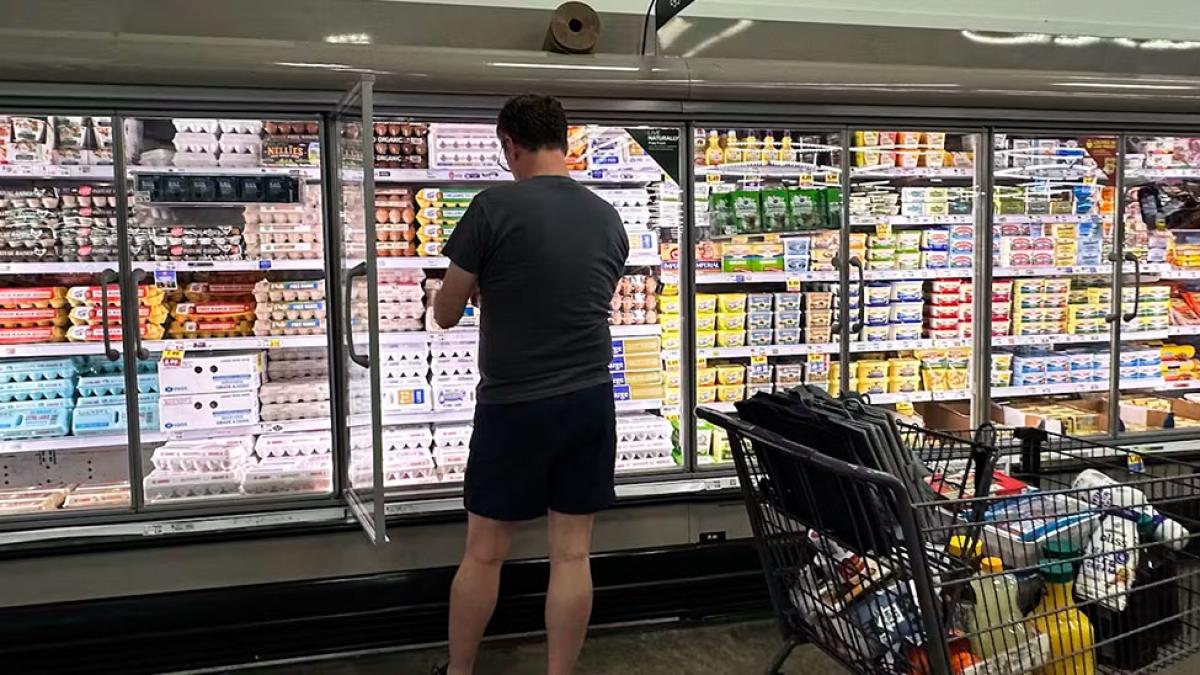
After a brief discussion on stagnant real wages and the minimum wage's declining real value, Dolar broke down three of Trump’s economic policies that may have the opposite effect of what his supporters had hoped for. These include tariffs (Americans usually paying the bill); the deportation of millions of migrants (the creation of a labor shortage); and tax cuts (risking fueling too much demand and resulting price hikes).
She said, “Taken together, many of Trump’s proposed policies may inadvertently fuel another ‘inflation nightmare.’”
This piece was also published in The Sun Chronicle, The Houston Chronicle, Seattle PI, Fast Company, and Yahoo Finance.
Haub Law's Negotiation Teams Earn Major Recognition in the Villanova Baseball Filing Day Competition
The Elisabeth Haub School of Law at Pace University's negotiation teams performed admirably in the Villanova Baseball Filing Day Competition, with one of Pace's teams winning the entire competition.
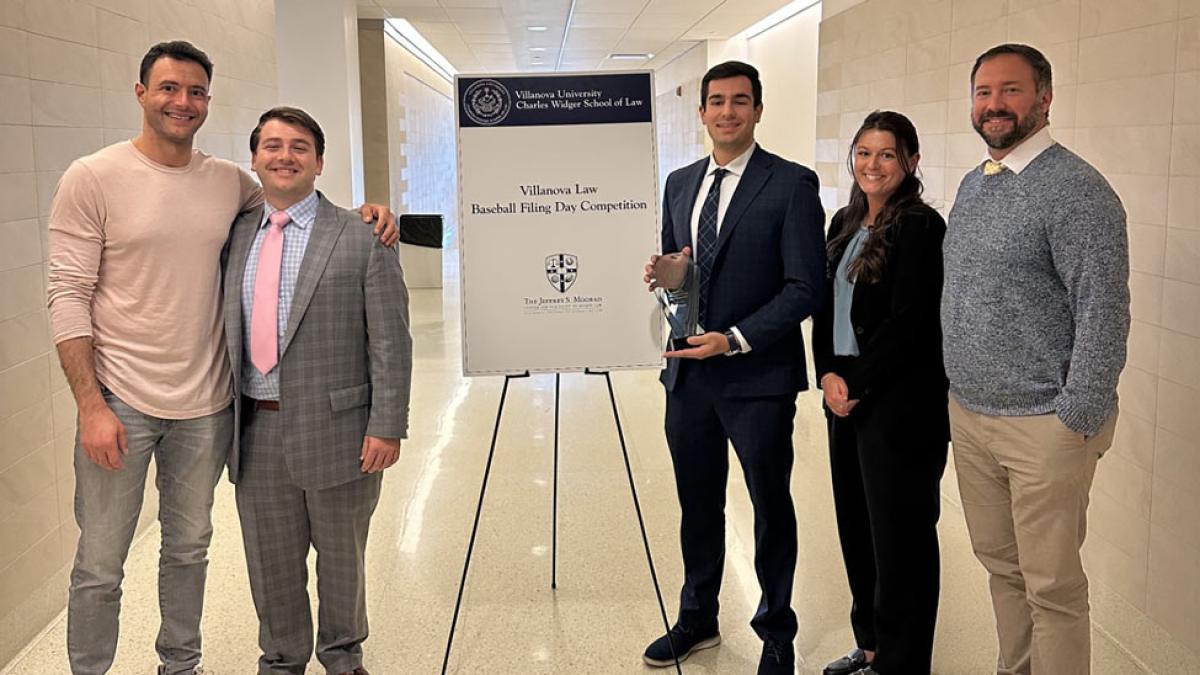
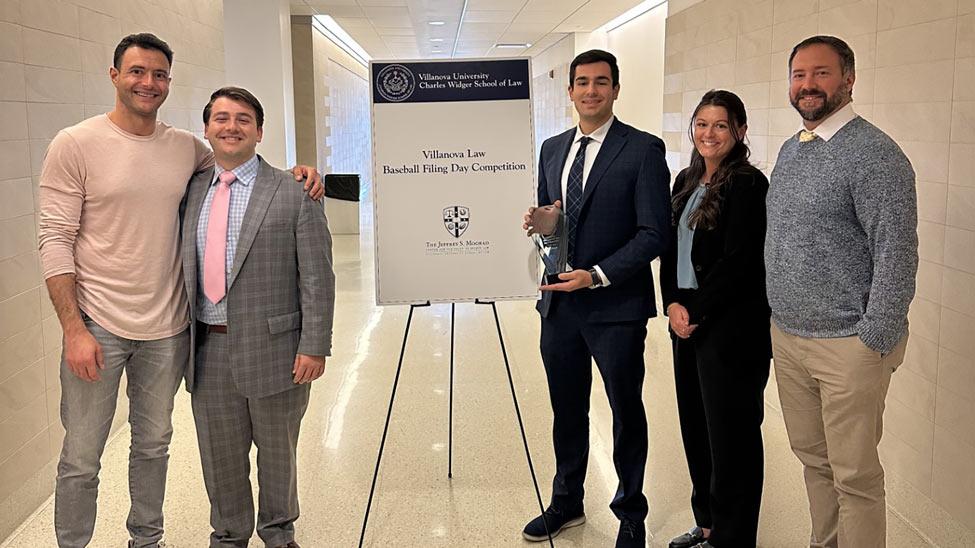
The Elisabeth Haub School of Law at Pace University's negotiation teams earned major recognition in the Villanova Baseball Filing Day Competition held October 25–26, 2024 at Villanova University Charles Widger School of Law. One of Haub Law’s teams advanced to the semi-finals, and another was awarded the highly coveted first-place prize.
Under the coaching of Haub Law Alumnus, Dan Masi ‘14, two pairs of students consisting of Marc Bisogno (3L) and Mike Minoli (2L), and Maddie Law (2L) and Andrew Leffler (3L) performed admirably in the negotiation rounds on Day 1, and advanced to Day 2, where they had 12 hours to prepare for the quarter-finals round. After winning the quarter-finals round, Maddie Law and Andrew Leffler narrowly missed out on advancing to the finals; Marc Bisogno and Mike Minoli were declared the winners of the quarter-finals, semi-finals, and final competitions. Both teams earned widespread recognition for their performance.
The Villanova Baseball Filing Day Competition is a simulated exercise intended to mimic negotiations between MLB Players Association (MLBPA) player agents and MLB club executives before the salary arbitration Exchange Date between the MLB Labor Relations Department and the MLBPA as governed by Major League Baseball's Basic Agreement. Participants build oral advocacy and negotiation skills while handling baseball statistics and player valuation information in order to come to resolution with opposing counsel.
More from Pace
Haub Law's negotiation team advanced to the semi-finals in the Villanova Baseball Filing Day Competition held November 3-4, 2023 at Villanova University Charles Widger School of Law.
The Elisabeth Haub School of Law at Pace University trial team won the 2024 National Trial League Competition, making them national champions! This is the first time Haub Law has won both the season and the championship title since joining the competition in 2020, marking a significant milestone for the Trial Advocacy Program.
A team of students from the Elisabeth Haub School of Law at Pace University’s Advocacy Program received a “Golden Ticket” to participate in the prestigious 3-day Summit Cup Mock Trial Competition October 3–5, 2024, hosted by the University of Denver – Sturm College of Law.
Haub Law's National Trial League Team Reigns As Regular Season Champions
The Elisabeth Haub School of Law at Pace University trial team were declared regular season champions of the National Trial League for the second consecutive year. They look to carry their momentum into the finals in January.
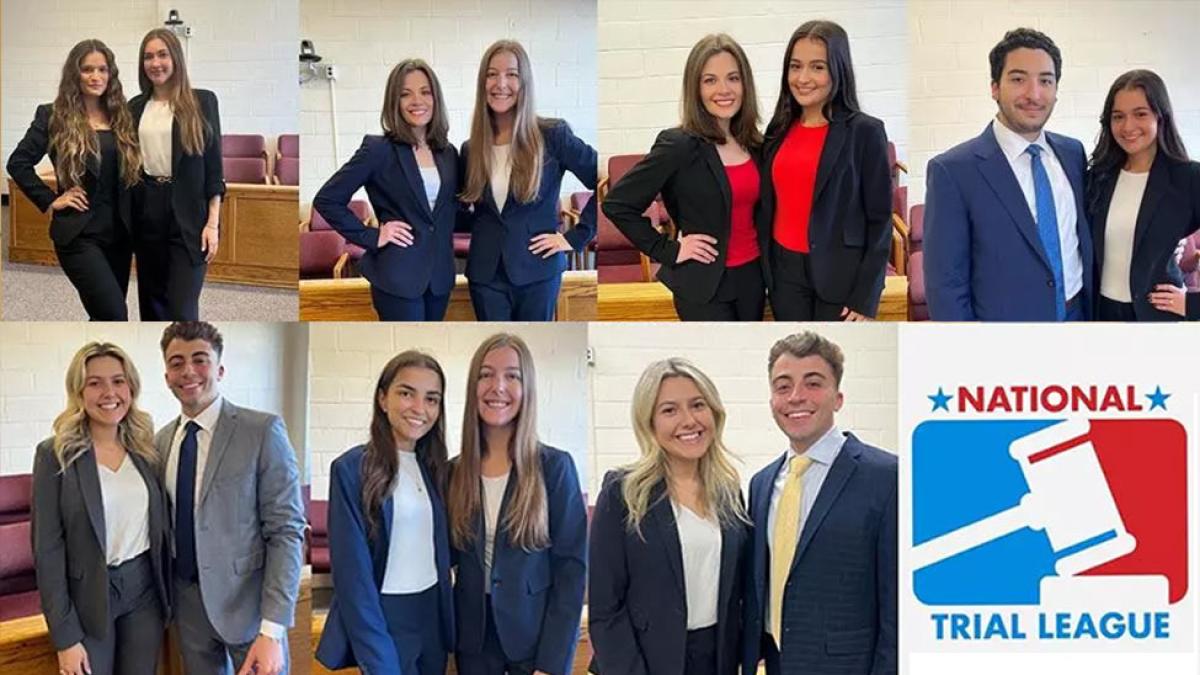
In January 2024 the Elisabeth Haub School of Law at Pace University trial team won the 2023–2024 National Trial League Competition, making them national champions. This season, Haub Law’s new team is poised to repeat their major accomplishment–and is already halfway there, having just been declared regular season champions for the second consecutive year.
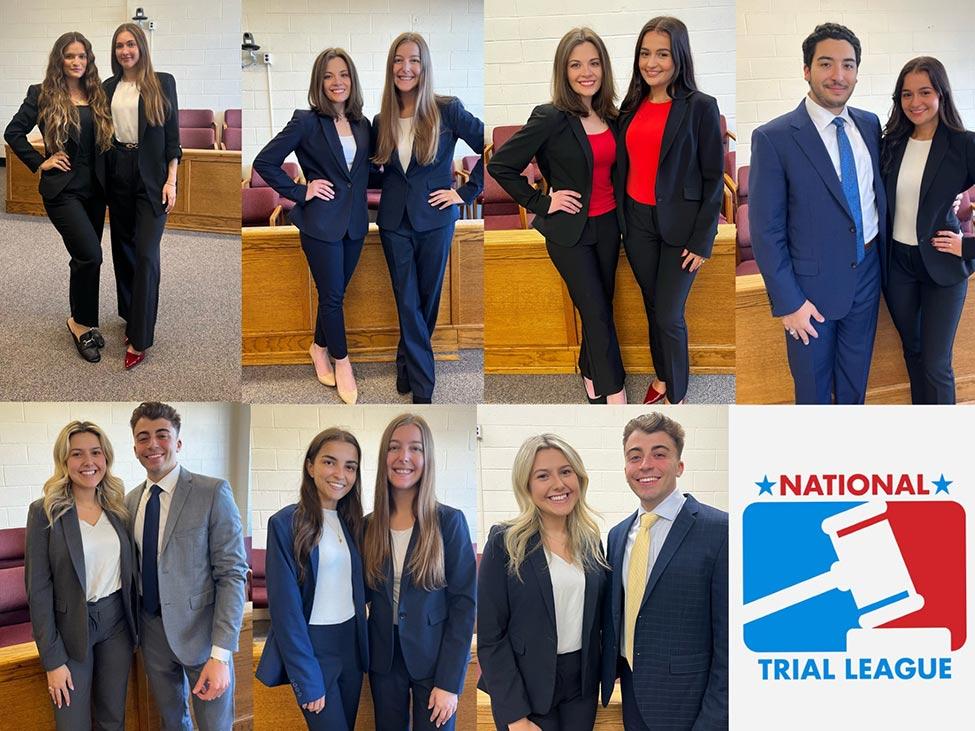
Throughout the fall 2024 semester, a team of Haub Law students have been competing in the National Trial League (NTL) mock trial competition hosted by Todd Berger at Syracuse University. NTL provides a unique and competitive environment where students have multiple opportunities to hone their trial skills in a fast-paced, online setting throughout the academic semester. It also creates an excellent platform for schools to compete outside the traditional weekend tournament structure.
The competition features 14 teams in a season format, resembling a traditional sports league, with two conferences comprising seven teams each. The regular season consists of seven rounds of competition every two weeks from August through November. Based on win-loss records, point differentials, and total points, the top four teams are selected to move on to the playoffs, which are held in January.
This is the fourth season of NTL and the fourth time the Elisabeth Haub School of Law at Pace University has been invited to compete. Twelve Haub Law students participated as advocates during this year’s competition, with many competing in multiple rounds. Advocates included Paige Padula (3L), Katerina Balukas (3L), Alexandra Tagliamonti (3L) (two rounds), Eva Juncaj (3L) (two rounds), Tyler Justic (3L), Madison Lane (3L) (two rounds), Steven Caputo (3L) (two rounds), Priscilla Holloway (3L), and Julia Stueber (3L) (two rounds). Witnesses included Madison Lane (two rounds), Skyler Pozo (2L) (two rounds), Jaimee Villas (3L) (two rounds), and Silvana Martinaj (3L).
During rounds, several Haub Law students were recognized as Best Advocates, including Katerina Balukas, Eva Juncaj, Tyler Justic, Julia Stueber, and Madison Lane (2 rounds).
“I could not be more proud of the collective effort and the outstanding coaching by our recent Alums,” said Director Professor Louis V. Fasulo. “In true Pace Spirit, the collaboration, intensive work and passion displayed throughout the regular season resulted in an unprecedented 2nd regular season top ranking. This competition reflects the best in the competition circuit including great schools, great organization and challenging cases. We look forward to playoff in January.”
Three Haub Law alumni (and former advocates themselves) have coached the team this season: Joseph Demonte ’24, Liam Rattigan ’24, and Matthew Mattesi ’24, who generously dedicated their time despite the demands of their new careers as attorneys, having just passed the bar exam in July 2024.
“The NTL tournament is very challenging as there is limited time to prep the case but our advocates worked together, kept getting better, and never gave up. It truly was an honor to coach the next generation of litigators,” added Alumnus Joe Demonte.
Representing Haub Law in the final round taking place in January will be Madison Lane (3L) and Eva Juncaj (3L). The team will be advocating for both sides, plaintiff/prosecution and defense.
